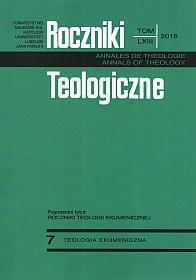“Economy of Life” versus “Economy of Greed”: The World Council of Churches Promoting Sustainability
Abstract
The article describes one of the key social documents of the World Council of Churches: Economy of Life, Justice, and Peace for All: A Call to Action. The document issued in 2012 is a crowning of six-years process of studies called AGAPE (Alternative Globalization Addressing People and Earth). At the basis of the document lies the conviction about the necessity to confront the unjust world economic system. Neoliberal fundamentalism of the free market creates the “structures of sin” based on the economy of greed and egotism. Economical growth in these structures brings benefits only to the rich, leaving the poor even poorer.
The study group of the WCC proposes to reverse the neoliberal paradigm by “affirmation of life” and “transformative spirituality.” “Economy of life” should lead to sustainability, through which everyone’s basic needs will be met. The Churches are called to join and promote the “economy of life” by various means, e.g. by promoting the idea of the “fair trade.”
References
Boerma Coenraad: The Poor Side of Europe. The Church and the (New) Poor of Western Europe, Geneva: WCC Publications 1989.
Dommen Edward, How Just Is the Market Economy?, Geneva: WCC Publications 2003.
Drimmelan Rob van: Faith in a Global Economy, Geneva: WCC Publications 1998.
Economy of Life. Linking Poverty, Wealth and Ecology, red. Rogate R. Mshana, Athena Peralta, Geneva: WCC Publications 2015.
Greenaway Kristine: Transformative Spirituality: a spirituality of encounter. In: World Council of Churches Pilgrimage of Justice and Peace, World Council of Churches Pilgrimage of Justice and Peace, https://www.oikoumene.org/en/resources/documents/wcc-programmes/spiritual-life/transformative-spirituality-a-spirituality-of-encounter (dostęp: 20.01.2016).
Peralta Athena, Ecological Debt: the Peoples of the South are the Creditors. Cases from Ecuador, Mozambique, Brazil and India, Geneva: WCC Publications 2006.
Rogacin Wojciech, Jeden procent populacji ma prawie tyle pieniędzy, co... pozostałe 99 procent, http://www.polskatimes.pl/artykul/3720682,jeden-procent-populacji-ma-prawie-tyle-pieniedzy-co-pozostale-99-procent,id,t.html (dostęp 19.01.2016).
Roundtable: Justice, Injustice and the Churches, w: Encountering the God of Life. Report of the 10th Assembly of the World Council of Churches, red. Erlinda N. Senturias and Theodore A. Gill, Jr., Geneva: WCC Publications 2014, s. 125-133.
World Council of Churches, AGAPE Consultation on Poverty, Wealth, and Ecology in Asia and the Pacific. Chiang Mai Declaration, w: http://kairoseuropa.de/wp-content/uploads/2015/08/chiang_mai_declaration.pdf (dostęp: 12.01.2016).
World Council Of Churches, Economy of Life, Justice, and Peace for All: A Call to Action, https://www.oikoumene.org/en/resources/documents/wcc-programmes/public-witness-addressing-power-affirming-peace/poverty-wealth-and-ecology/neoliberal-paradigm/agape-call-for-action-2012 (dostęp 11.01.2016).
World Council of Churches, Report of the Greed Line Study Group, http://www.oikoumene.org/en/resources/documents/wcc-programmes/public-witness-addressing-power-affirming-peace/poverty-wealth-and-ecology/the-report-of-the-greed-line-study-group-of-the-wcc/@@download/file/TheReportOfTheGreedLineStudyGroup_AthenaPeraltaEtAl.pdf (dostęp: 12.01.2016).
World Council of Churches, Statement on Just Finance and an Economy of Life. 02 September 2009, w: https://www.oikoumene.org/en/resources/documents/central-committee/2009/report-on-public-issues/statement-on-just-finance-and-the-economy-of-life (dostęp 12.01.2016).
Copyright (c) 2016 Roczniki Teologiczne

This work is licensed under a Creative Commons Attribution-NonCommercial-NoDerivatives 4.0 International License.





